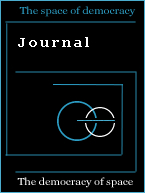The Spaces of Democracy and the Democracy of Space journal
Forthcoming
There has been a ‘spatial turn’ in the social sciences and humanities. New institutions, personalities and ontology are seeking to change the way we think about space and place. From the different works of Deleuze, Latour, Thrift and Massey; to Harvey, Connolly, Stengers, Bennett and Soja, in the wake of globalisation new ontologies all move to question and denaturalise territorial entities. There has been a marked shift toward a less demarcated, hierarchical understanding of the spatial. This is no longer conceived in terms of pre-defined territorial containers. Rather, new geographical metaphors have come to the fore, dominating discussion today:- interdependence’, ‘complexity’, ‘chaos’, ‘multiplicity’, ‘post-territoriality’, ‘hybridity’, ‘global order’, and so on. This is demonstrated in the theories developed in many University Departments today. Other new material practices, such as the internet and media developments, seem only to further turn people’s gaze towards the intensive interrogation of the spatial, which we are presently witnessing.
In short, the older concepts of space are being seriously challenged. But the practical consequences of this paradigm shift for politics are unexplored. We therefore seek to force the question:-
How is the spatial turn disciplining the way we think about politics today?
Not wishing to support or attack the spatial turn, we instead take it as a focus of investigation. Which means taking an interest in practical consequences of the turn; taking to task, interrogating and investigating the political implications of new spatial ontologies, institutions, forces and personalities.
And so the journal takes a reflective ‘step back’. For it is not concerned with how spatial and material practices become issues that are implicated in the production of new political assemblages and spaces of politics. That is rather the concern of those who dominate the spatial turn. We instead want to take an interest in how those new forms of enquiry, personalities and methodologies into the spatial are themselves guiding and shaping how we think about politics today.
Chief Editor:
Jonathan Pugh (Newcastle University).
Editorial Board :-
Mercedes Barros (Universidad Nacional de Córdoba).
Sebastian Barros (Universidad Nacional de Córdoba)
Swapna Banerjee-Guha (Tata Institute of Social Sciences, Mumbai).
Judy Brown (Victoria University of Wellington).
David Carter (University of Wellington).
David Chandler (Centre for the Study of Democracy, University of Westminster).
Vincent Del Casino (California State, Long Beach).
David Featherstone (University of Liverpool).
Benedikt Korf (ETH Zurich, Switzerland).
Alejandro Groppo (Universidad Nacional de Córdoba).
David Howarth (Essex University).
Susan Mains (University of West Indies-Mona).
Noortje Marres (Goldsmiths College, University of London).
Aletta Norval (Essex University).
Deborah Thien (California State, Long Beach).
Maria Theodorou (School of ARCHitecture for All).
David Murakami Wood (Newcastle University).
Subscription Policy and Copyright
When launched, the journal will be free and operate under a Creative Commons agreement. We do not have any income sources for the journal, so if you are interested in supporting it, please contact Jonathan.Pugh@ncl.ac.uk.
Submission process
If you would like to explore the opportunity of publishing in this forthcoming journal, please contact Jonathan.Pugh@ncl.ac.uk.
| |

|
Volume 1 - forthcoming |
|
|
|
|
| |
|
|
| |
|
|